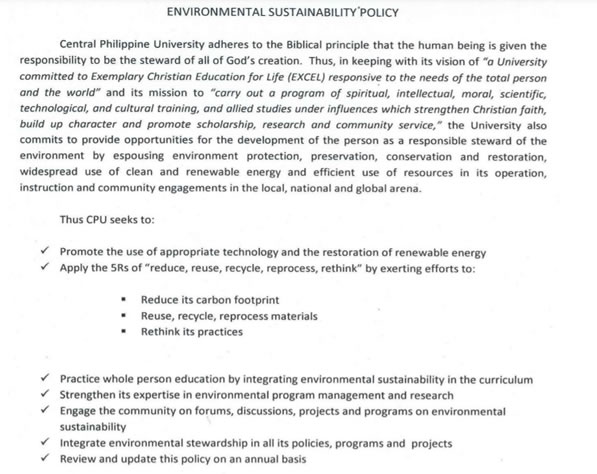The Philippines is highly susceptible to disasters arising from climate change. In response to this threat and as an exercise of its Christian stewardship, the university seeks to be sustainable and eco-friendly in its operations and to provide a model and partner to the community on its advocacy. Its environmental sustainability framework anchors on its vision, mission, core values, and quality policy. Its core functions as a higher education institution are utilized as channels of this framework.
The elements of the framework include:
1. The University core value of stewardship
This value is the faithful management of resources entrusted by the Owner (God) to a servant, with the accountability to put the resources to work to gain more and share more, thus giving joy to the Owner. This is one of the core values that are taught and modeled in the University.
https://cpu.edu.ph/core/CPU-Core-Values-Booklet-Final.pdf
This core value is emphasized to the University community. Its teaching is included in every syllabus.
2. Policies and strategic plan that incorporate environmental sustainability
The commitment of Central Philippine University (CPU) is embodied in its environmental policy which was approved by the Board of Trustees last December 2014 through Resolution No. 24, CPUBT 12/6/14 –
The strategic plan incorporates environmental sustainability in the initiatives of the University. Solar street lighting, for example, is expected to be one of the key features of the updated plan.
3. Academic programs, projects, and activities that promote environmental sustainability
The College of Agriculture Resources and Environmental Sciences, for example, hosts the Appropriate Technology Center and the Department of Agricultural Engineering and Environmental Management. Environmental stewardship is incorporated in general education subjects such as the National Service and Training Program (NSTP). The use of local materials is also promoted, e.g. in extension projects such as the production of chicken feed.
The Affiliated Renewable Energy Center under the College of Engineering also advocates for renewable energy.
The research agenda include the aspect of the environment. Researches on biomass briquetting, for example, have been conducted. The promotion of circular economy is an ongoing pursuit: https://www.youtube.com/watch?v=dzYSQYV7eUI
4. Institutionalization of a sustainable campus program
A Sustainable Campus Committee was appointed starting April 2017. Improvement of the materials recovery facility, development of an eco-park (https://cpu.edu.ph/news/eco-park-a-sustainable-campus-project/), enforcement of solid waste segregation are among the initiatives that have been pursued.
5. Advocacy/ promotion with the community and other partners
To extend its influence on environmental sustainability, CPU has partnered with the community and other organizations. One of these is the Haribon Foundation (www.haribon.org.ph) to promote Biodiversity- on-Wheels (BOW). Webinars and forums have been conducted (https://cpu.edu.ph/news/ovpsa-holds-webinar-on-solid-waste-management/ )
CPU also supports local, national, and international programs and projects for the environment. One of these is the tree-planting program of the government (https://cpu.edu.ph/news/cpu-joins-city-wide-tree-planting-activity/) and the Department of Environment and Natural Resources (DENR) adopt an Estero project (https://cpu.edu.ph/news/cpur-participates-in-denr-emb-adopt-an-estero-project/)
In recognition of its efforts, CPU has been named a Sustainable and Eco-Friendly School by the DENR. It has been selected as a partner by several overseas development and government agencies such as the USAID, German International Cooperation, and many others in promoting environmental sustainability.

